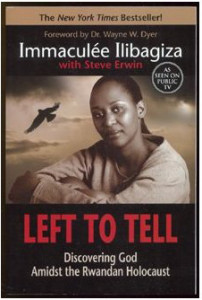 Immaculée Ilibagiza, a young woman born in Rwanda, tells of her horrifying time during the Rwandan massacres that began in April, 1994, twenty years ago this month. Most of her family were slaughtered. Hidden in a bathroom with seven other women, she endured ninety-one days of cramped hiding. She tells her story in Left to Tell: Discovering God Amidst the Rwandan Holocaust.
Immaculée Ilibagiza, a young woman born in Rwanda, tells of her horrifying time during the Rwandan massacres that began in April, 1994, twenty years ago this month. Most of her family were slaughtered. Hidden in a bathroom with seven other women, she endured ninety-one days of cramped hiding. She tells her story in Left to Tell: Discovering God Amidst the Rwandan Holocaust.
Immaculée was born into a middle-class family of educators. She attended schools, including college. Suddenly the horror broke out. Hatred flared between otherwise peaceful neighbors. Terrified masses crowded into churches but were murdered anyway, sometimes burned with their churches—by those supposedly of their own Christian faith.
How did people who had given allegiance to the same Christian Jesus turn into angry, brutal mobs?
All of Immaculée’s family except herself and one brother died. After a miraculous survival, she was able to meet with the killer of her mother and one of her brothers. The man was now a prisoner, wearing dirty clothes, his hair matted, filthy. Before her, the murderer began sobbing. Immaculée said she felt his shame.
“I reached out, touched his hands lightly, and quietly said what I’d come to say.
‘I forgive you.’”
Then, she said, her heart eased. Later she told the astonished jailer, “Forgiveness is all I have to offer.”
We take away from this story the power of forgiveness to heal, as much for the sinned against as for the sinner. The only hope we have for dousing the bitter strife that inflicts the globe in a multitude of conflicts is the sacrifice of our hatred. We have a right to hate, but we choose not to hate and thus free ourselves by forgiveness.

